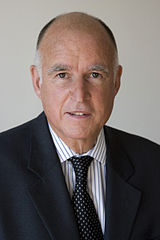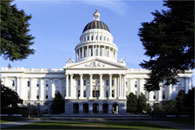October 9, 2017 •
California Governor Signs Campaign Finance Disclosure Bill
Gov. Jerry Brown signed Assembly Bill 249 on October 7, which amends the Political Reform Act. The bill requires campaign advertisements to identify the name of the committee paying for the advertisement, as well as clearly displaying the top three […]
 Gov. Jerry Brown signed Assembly Bill 249 on October 7, which amends the Political Reform Act.
Gov. Jerry Brown signed Assembly Bill 249 on October 7, which amends the Political Reform Act.
The bill requires campaign advertisements to identify the name of the committee paying for the advertisement, as well as clearly displaying the top three contributors to that committee.
The bill also expands disclosure requirements for mass electronic mailings and telephone calls. The bill is effective immediately.
September 18, 2017 •
California Legislature Adjourns
The California Legislature adjourned in the early hours of September 16. Bills passed in the late-night session include Senate Bill 568, which would move the presidential primary election to March; Assembly Bill 249, which would require campaign advertisements to clearly […]
 The California Legislature adjourned in the early hours of September 16.
The California Legislature adjourned in the early hours of September 16.
Bills passed in the late-night session include Senate Bill 568, which would move the presidential primary election to March; Assembly Bill 249, which would require campaign advertisements to clearly display their largest funders; and Assembly Bill 132, which would require counties to provide additional voter education and requires every signature of a recall petition to be examined and verified.
The bills are now waiting for Gov. Jerry Brown’s signature or veto.
August 28, 2017 •
California Disclose Act Gets Closer to Passage
Assembly Bill 249, also known as the “California Disclose Act,” will be heard in the Senate on August 29. The bill requires most campaign ads to display their top three funders, even if those contributions were funneled through other committees. […]
 Assembly Bill 249, also known as the “California Disclose Act,” will be heard in the Senate on August 29. The bill requires most campaign ads to display their top three funders, even if those contributions were funneled through other committees.
Assembly Bill 249, also known as the “California Disclose Act,” will be heard in the Senate on August 29. The bill requires most campaign ads to display their top three funders, even if those contributions were funneled through other committees.
Similar versions of AB 249 have been introduced without passage since 2012. A similar bill from 2016 failed by one vote in the Senate. Last year’s bill was opposed by the California Fair Political Practice Commission (FPPC) due to the bill’s language making enforcement difficult.
The current version of the bill underwent changes to make the proposed law more acceptable to opponents and the FPPC has remained neutral.
State and Federal Communications, Inc. provides research and consulting services for government relations professionals on lobbying laws, procurement lobbying laws, political contribution laws in the United States and Canada. Learn more by visiting stateandfed.com.

